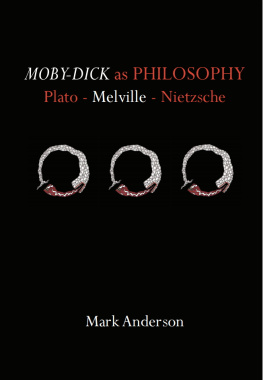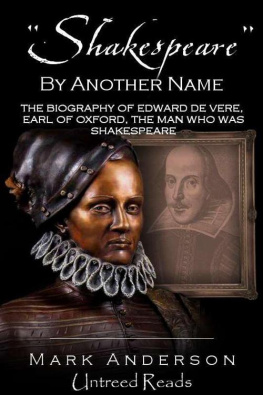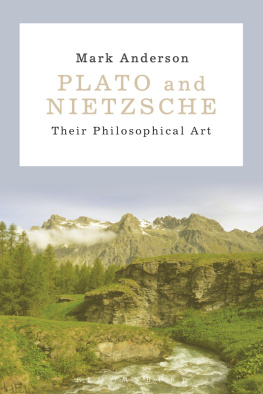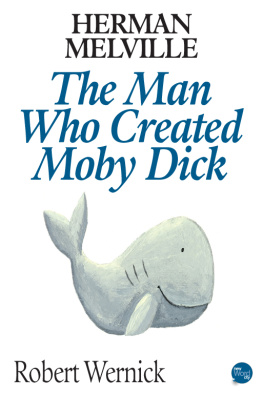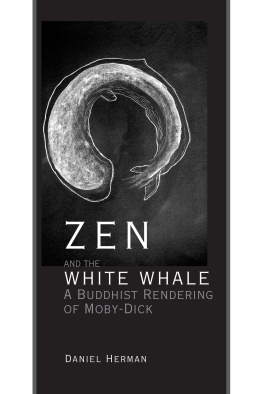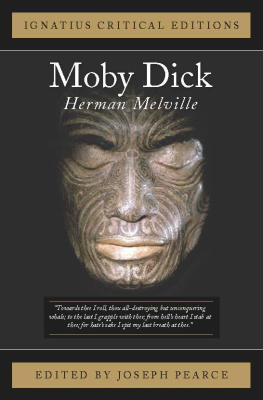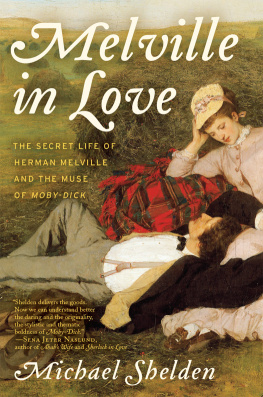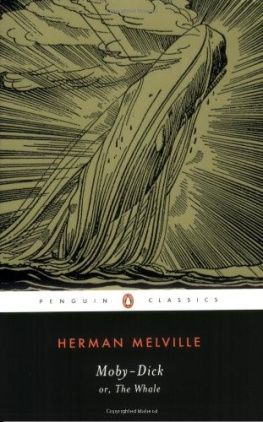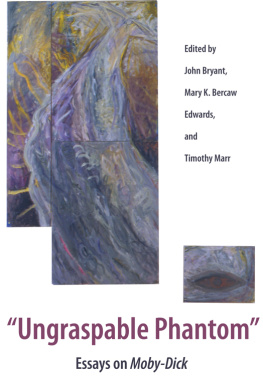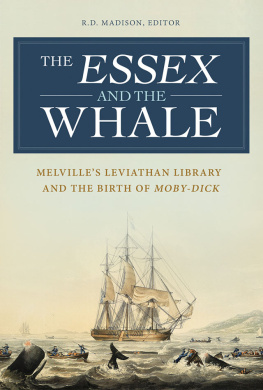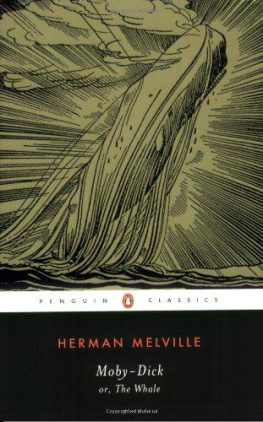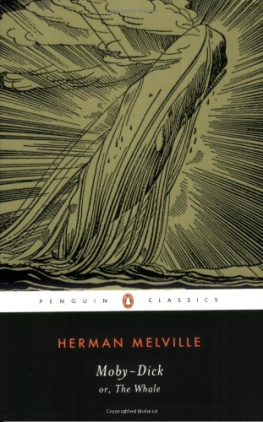Moby-Dick as Philosophy
Mark Anderson
S.Ph. Press
Nashville, TN
Copyright 2015 by S.Ph. Press
All rights reserved. No part of this publication may be reproduced or utilized in any form or by any means without permission in writing from the publisher.
ISBN-13: 978-0-9967725-1-8
Library of Congress Control Number: 2015914307
Cover art by Matt Kish,
design by Mark Anderson
www.sphpress.com
Contents
About the Author
Mark Anderson is Associate Professor, Chair of the Department of Philosophy, and Director of Classics at Belmont University in Nashville, TN, USA. He writes about philosophyPlato, Melville, and Nietzsche in particular. His writing is informed by traditional scholarship, but he writes in a creative rather than a scholarly mode.
Pure: Modernity, Philosophy, and the One is an aphoristic work of original philosophy in the spirit of Platonism.
The Thinker-Artist (Sophia and Philosophia) is a creative-experimental work about the philosophical life written as both philosophy and fiction.
Plato and Nietzsche: Their Philosophical Art is a work of scholarship intended for both scholars and the thoughtful general reader. It is an introduction to those of Plato's and Nietzsche's ideas that can be brought together in dialogue or debate. It includes original reflections throughout on the nature and practice of philosophy.
These three works stand alone as works of philosophy and/or scholarship, but together they provide a progressive account of, or tell the story of, one minds thinking through the nature of philosophy and what it means to be a philosopher.
For more on these books, and for links to Mark Andersons academic articles, please see the following site:
https://belmont.academia.edu/markanderson
Other books by Mark Anderson
Pure: Modernity, Philosophy, and the One
The Thinker-Artist (Sophia and Philosophia)
Plato and Nietzsche: Their Philosophical Art
For more on these books, and for links to Mark Andersons academic articles, please see the following site:
https://belmont.academia.edu/markanderson
Moby-Dick as Philosophy
Plato Melville Nietzsche
Mark Anderson
Etymology
The ancient Greek word , philosophy, derives from the word , philosopher, which is itself a compound of two other words, and . The word is a noun that denotes a friend, one who is fond of, one who loves, someone or something. The word , also a noun, translates as wisdom. The philosopher, then, is one who loves wisdom; and philosophy, as everyone knows, is the love of wisdom. Yet it is not so easy to elaborate on this simple definition. What exactly is wisdom? And what is the proper mode of the philosophers love? A philosopher grounds his self-conception on his answers to these questions. What is he as a philosopher? What does she do, how does she live, as a lover of wisdom? It seems to me that we have lost sight of the relevance of these questions, and that our conception of philosophy has suffered as a result. Hence this study of Plato, Melville, and Nietzsche, which is in a way a meditation on wisdom and the love of wisdom, and thereby also an attempt to revise our contemporary conception of the philosopher.
The history of this book begins with two other books. The first of these I was writing myself, or anyway trying to write. Wisdom and the Love of Wisdom: Plato Michelangelo Melville Nietzsche. This was to be the title. The substance of the work I envisioned as similar to the substance of this present book, which I explain below. I say that I was trying to write the book: I had drawn up a detailed outline; I had even written a few thousand words. But I could not begin to write in earnest. I was stalled at the preliminary stage of thinking, planning, taking notes, and composing paragraphs or sections here and there, more or less at random. One can infer from the title that Melville was central to my project, but also that I had not thought to structure the book around a reading of Moby-Dick. And here the second book is relevanta chapter-by-chapter commentary on Moby-Dick I happened across one day by accident. It did not occur to me then that the book might be relevant to my own work, at least not directly. I simply wanted to read it, as I want to read most every book on Melville in general and Moby-Dick in particular. Unfortunately, I didnt much like it. The title led one to expect a deep dive into Melvilles mind, but the book really only skimmed the surface. Moreover, the chapters often had little or no connection to the deepest layers of the content of the corresponding chapters of the novel, nor did they hang together to form an overarching account, story, or portrait of either Melvilles masterpiece or the man himself. Moby-Dick is a profoundly philosophical work, but the author of the commentary seemed determined to discuss everything but the philosophical substance of the novel. So one afternoon as I was reading the book and brooding on my disappointment, not long after exploring the idea of dropping Michelangelo from my own book to concentrate exclusively on Plato, Melville, and Nietzsche, it occurred to me that I could produce the book Id been trying to write by adopting this format of a chapter-by-chapter commentary on Moby-Dick. I knew that Melville had read Platos dialogues, the Phaedo in particular, also that he mentions Plato and the Phaedo explicitly in Moby-Dick, and alludes throughout the novel to themes in Platonic philosophy. I had moreover long been struck by his anticipation in Moby-Dick of elements of Nietzsches philosophy, the death of God, for example, and the potentially nihilistic consequences of this event. Now everything fell into place. I could see my work laid out before my minds eye, at least in its general contours. I began writing in earnest the following day and did not stop until I completed a draft six months later.
Regarding the substance of this book, I should state here at the start that it is not quite a straightforward commentary on Moby-Dick. Think of it as a series of reflections on the novels philosophical content (also the philosophically relevant historical, spiritual, and mythological content), with something like an argument surfacing and sounding here and there throughout the length of the work. I say something like an argument because I employ the word in part as is standard in recent usage, according to which an argument is a sequence of statements or premises set out to support or justify a conclusion, but also in the somewhat more antiquated sense according to which an argument is the primary subject matter or theme of a discussion or story. As to the structure or form of my argument, it emerges gradually, a section here and there, in an order more suited to a digressive essay than to the concise formulation of a proof. Although I do intend to ground reasoned and reasonable assertions on actual facts, and thereby to elaborate an original new reading of Moby-Dick, my primary objective is to fashion a fresh image of the philosopheror, really, to return to an image that I think more nearly resembles the originalby superimposing portraits of Plato, Melville, and Nietzschethe thinkers themselves, their ideas and their livesto produce a composite image through the overlaying and interblending of figures. And this brings me to the content of my argument, which has to do with the nature of philosophy and its relation to wisdom, and the relation of creative artistry to both. I develop this theme by situating these matters in the context of the history of philosophy conceived as the rise and fall of a certain influential variety of Platonism, which rise and fall we may characterize in Nietzschean terms as the life and death of God; and I explore all this with reference to the different reactions, as exemplified particularly by Melville and Nietzsche, to the nihilism that looms on the horizon of these intellectual and spiritual revolutions.
Next page
